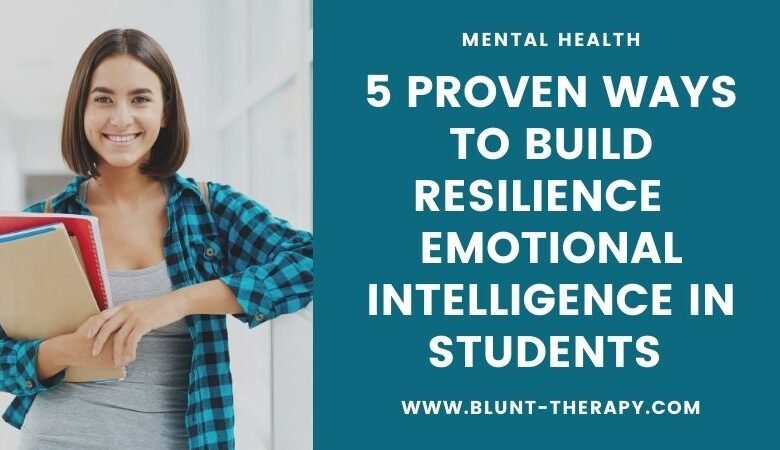5 Proven Ways To Develop Emotional Intelligence In Students

Affiliate link notice: As an affiliate of BetterHelp and other third-party vendors, We may receive compensation if you make a purchase using the links provided on this page. For more information, visit our disclosure page.
Last Updated on October 27, 2022 by Randy Withers, LCMHC
We tend to view childhood as a time of freedom and carelessness. However, the truth is far from that. This age offers no shield against the emotional challenges many children face, let alone learning to cope with them.
Part of growing up is developing the ability to understand the feelings of others and knowing how to overcome stressful and sometimes traumatic experiences in our lives. Adults have the mental capacity and skills needed to deal with specific problems, whereas children do not. That is why building resilience and emotional intelligence in students is a popular topic in health and education.
When educators help students “adopt an approach to life that views hurdles as a critical aspect of success,” they help them develop emotional sustenance. Many educators incorporate emotional and social learning programs into the curriculum to accomplish this goal.
But apart from these programs, there are many other ways educators can develop resilience and emotional intelligence in students. In this article, we’ll explore how educators can help students develop a success-achieving mindset through emotional intelligence.
How To Build Resilience and Emotional Intelligence in Students
Teach them social-emotional skills
Incorporating programs that include the teaching of social-emotional skills helps students achieve better academic outcomes. Sure, a whole-school approach is beneficial, but if your school isn’t at that stage, there’s a lot you can do in the classroom.
Work on improving peer relationships by explicitly teaching self-awareness, social awareness, decision-making responsibility, self-management, relationship skills, and helping retain knowledge. Today’s education system is complex, and a one-size-fits-all approach will not work. That is why educators need to examine how people learn and perceive knowledge.
If you are interested in furthering your education on the subject, one viable way to get your foot in the door is by enrolling in an MA Educational Psychology Online program. It’s an ideal degree for busy educators looking to learn psychology and improve the learning process for everyone.
Learning perseverance is crucial
Self-motivation is an essential component of developing resilience and emotional intelligence in students, and a requirement for all children to succeed in life. While many students will naturally strive to improve themselves somehow, others will require a little more guidance. Remind students that to thrive, they must exert effort and perseverance.
And, if you see students putting in a great deal of hard work, but still falling short of the grade, applaud them on their efforts and encourage them to keep trying until they get it right. Every student should be advised to set goals to feel a sense of accomplishment.
Besides, this helps counteract negative thoughts and encourages children to reach deep within themselves to find the determination to succeed.
Promote positive emotions
For many complicated reasons, including the pandemic, more students are experiencing stress and anxiety these days. A more positive outlook can be calming in the face of rejection, loss, disappointment, and fear.
One approach to addressing this in the classroom is encouraging positive thinking and emotion regulation. Eventually, the students will be in a much better mental state to deal with problems and relieve stress about certain aspects of their lives.
In addition, you can incorporate mindfulness techniques in the classroom and help boost positivity among your students. Also, try meditation in class (in person or online) by having students sit silently and perform guided breathing exercises for five minutes at the beginning of the lesson. Often, developing emotional intelligence in students requires a holistic approach.
Integrate character education
Character education promotes the growth of ethical and responsible students. To develop emotional intelligence in students, teach them the benefits of solid values, being trustworthy and honest, and accepting responsibility for their actions. Provide opportunities for your students to develop and hone these skills in the classroom. Discuss these abilities during history classes and reading activities. Encourage students to consider ways to become more responsible or trustworthy. Then, allow them to put their ideas into action. Recognize ethical and honest behavior, mainly when students accept responsibility for harmful actions.
However, this isn’t to say they should be excused from discipline, but rather recognize the importance of being truthful.
Teaching the importance of physical and mental well-being
Emotional intelligence and resilience are not only psychologically essential, but also physically. Students must be physically healthy to feel solid and ready for life’s challenges. And this includes getting enough sleep at night, regular exercise, eating a healthy diet, and drinking lots of water. It will not only keep students fit and healthy, but will also help them become more flexible, confident, and capable.
Facilitating a group discussion on healthy habits is an excellent way to get students thinking about their health and well-being. Make a list of your students’ suggestions and ask them to name one healthy habit, such as eating five pieces of fruit and veggies per day.
Final Thoughts
Building resilience and emotional intelligence in students takes time. As educators, you can follow these techniques to promote this habit in your students and help improve their social, academic, and emotional outcomes.
Also, to keep the process going, ask your students (once a week) to express one thing they are grateful for in life. Write everything down on the board and allow your students to review and discuss it. Note how this ritual changes their attitude, and remind them that they can use this strategy whenever they feel low due to negative thoughts.
Let me know if you liked this post. Your feedback is important!
Source link
#Proven #Ways #Develop #Emotional #Intelligence #Students

